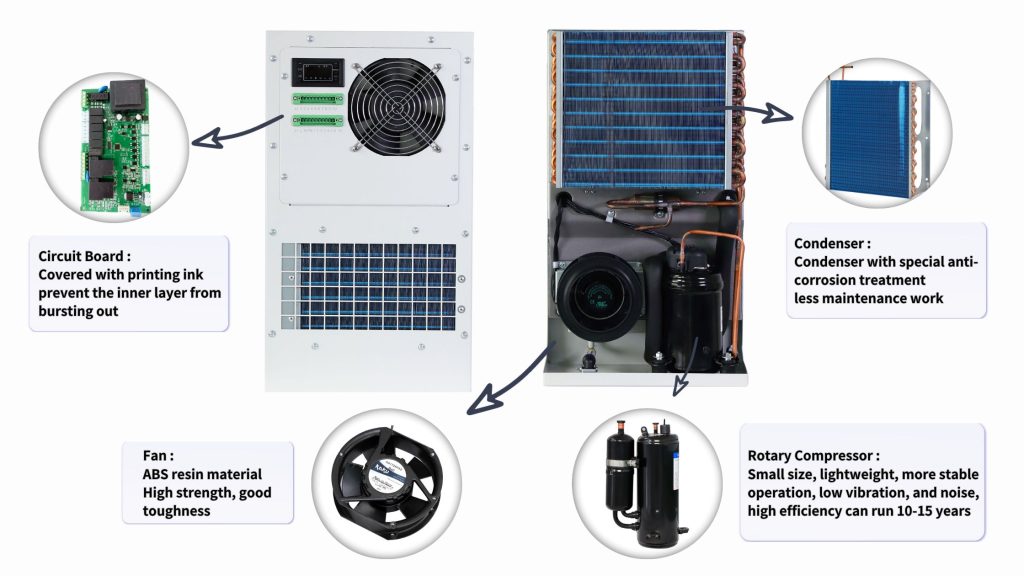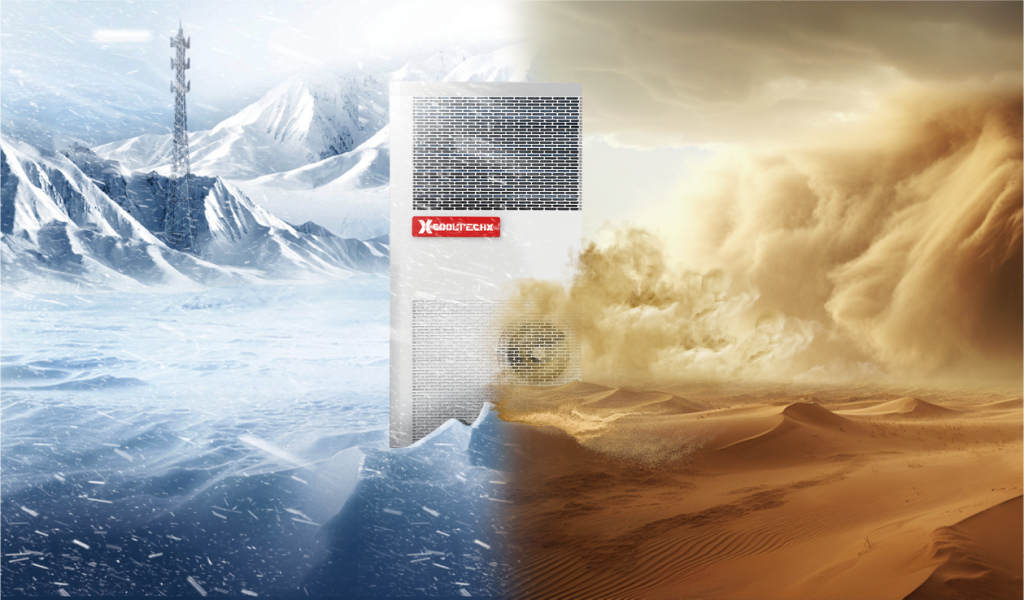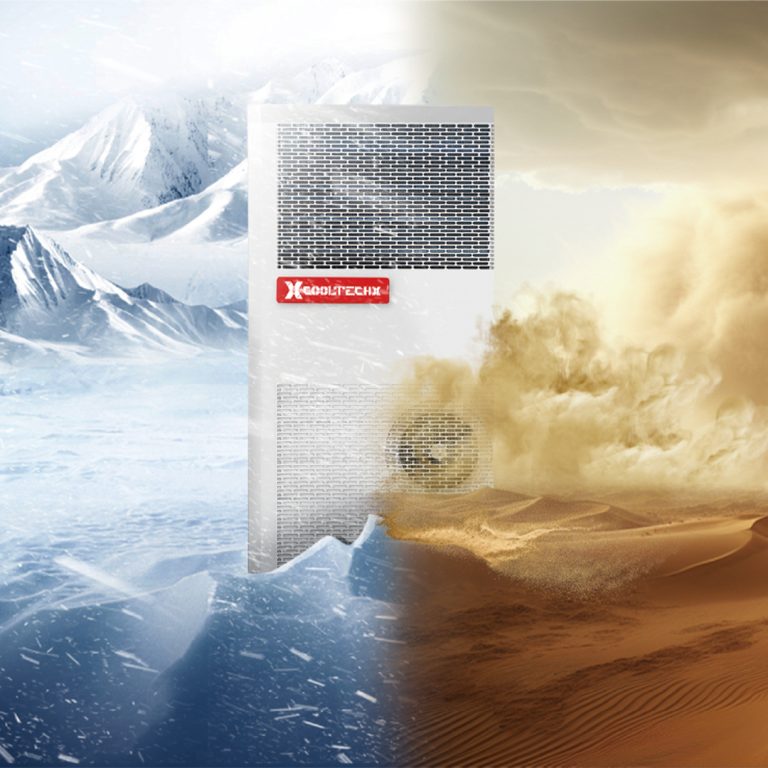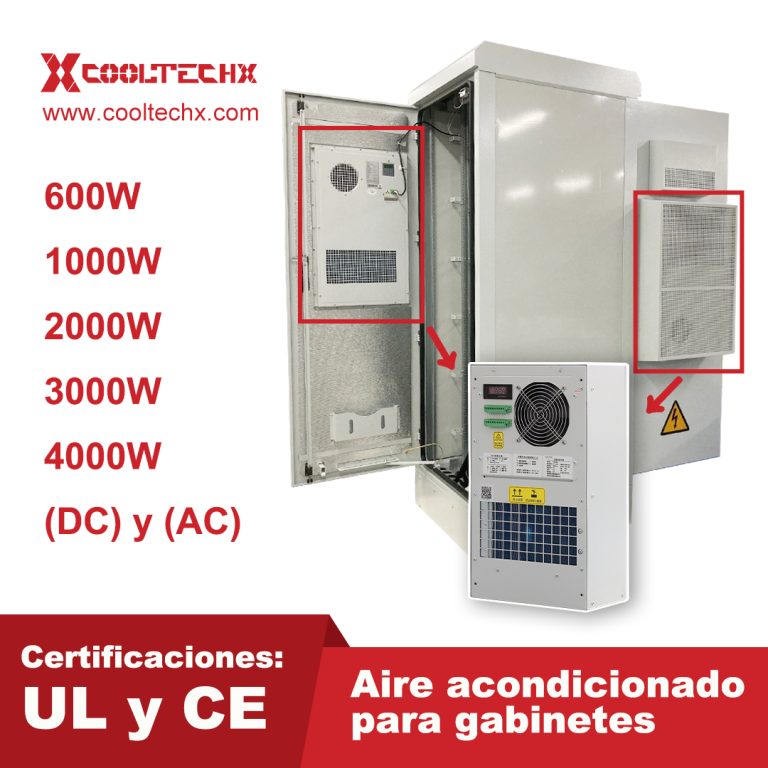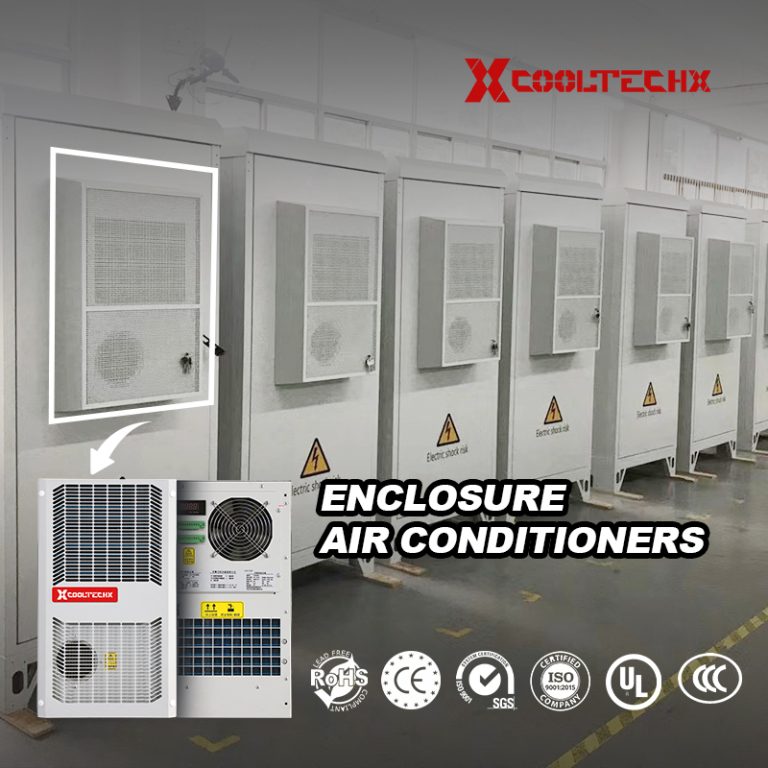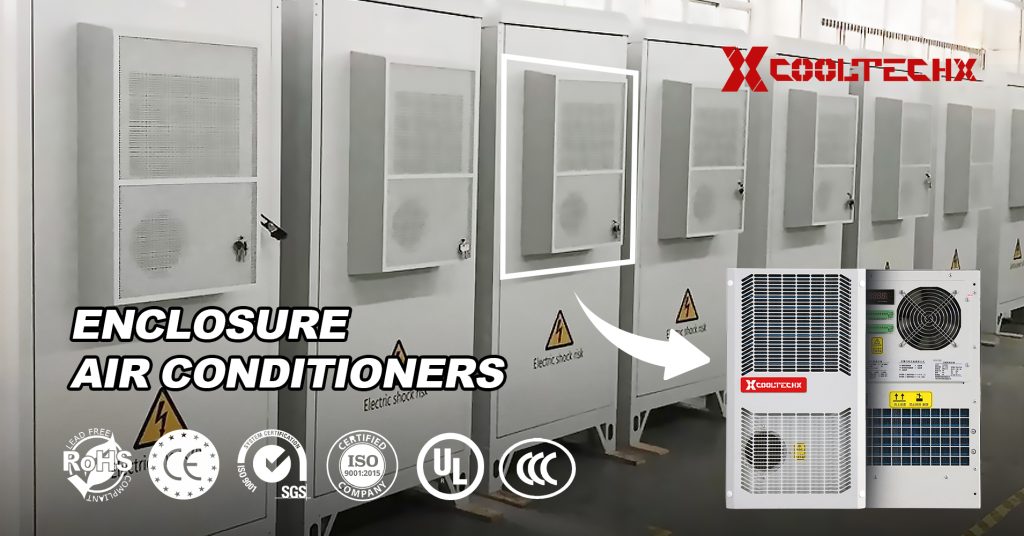
Choosing the right enclosure air conditioner is very important. It helps your equipment work well and last longer. Without good cooling, heat can harm parts and lower performance. It can also make your system wear out faster. Did you know portable air conditioners last only 5-10 years? Cooltechx air units can last up to 20 years. This depends on quality, care, and how well it suits the space.
Many things affect your choice. The heat from your equipment matters. The size of the enclosure for the air conditioner is important too. Surrounding conditions, like high humidity or dust, can cause damage. Tough environments can make even good systems break sooner. By thinking about these factors, your enclosure air conditioner will work better and protect your equipment.
Key Takeaways
- Find out how much heat your equipment makes. This helps you pick the right air conditioner for good performance.
- Use BTUH tools to choose the correct air conditioner size. The right size saves energy and protects your equipment.
- Think about the size of the enclosure and its surroundings. Good airflow and keeping out dust and water are very important.
- Pick energy-saving models to lower costs and help the planet. Look for things like Energy Star labels.
- Ask experts for help with tricky setups. Their tips can save money and keep your equipment safe.
Assessing Cooling Needs
Calculating Heat Load
Knowing your heat load is the first step to picking the right enclosure air conditioner. Heat load means how much heat is made inside the enclosure that needs to be removed to keep things working well. To figure it out, follow these steps:
- Check how fast water flows through the heat exchanger. For example, it might flow at 75.7 liters per minute.
- Write down the water temperatures going in and out, like 25°C and 28.8°C.
- Use water’s specific heat (4.179 kJ/kg-K) to find the temperature change.
- Use the heat load formula to calculate the heat load, which might be about 20 kW.
- Think about possible errors, like +/- 1.89 liters/minute for flow rate or +/- 1°C for temperatures.
- Find the highest and lowest heat load based on these errors.
These steps help you know exactly how much cooling your air conditioner needs.
You can also use industry examples to check your work. For instance:
| Concept | Formula/Example |
|---|---|
| Internal Heat Load | Internal Heat Load = 345 Watts |
| Delta T | ∆T (°F) = 104°F – 90°F = 14°F |
| Heat Load Transfer | Surface Area (ft.²) = 19 ft.² Heat Load Transfer = 0.22 x 19 ft.² = 4.2 Watts/°F |
| Cooling Capacity | Cooling Capacity = 345 Watts/14°F – 4.2 Watts/°F = 20.4 Watts/°F |
Using these examples and formulas will help you figure out your cooling needs.
Evaluating Enclosure Dimensions
The size and shape of your enclosure are important for cooling. Bigger enclosures need more cooling, while smaller ones need precise cooling. Here’s a simple guide to common sizes:
| Size (inches) | Description |
|---|---|
| 12 x 12 | Great for small projects with fewer parts. |
| 24 x 18 | Works well for medium setups like industrial machines. |
| 36 x 30 | Best for large systems with many parts. |
When choosing an enclosure, think about these things:
- Component Space: Make sure all parts fit without being too crowded.
- Ventilation Needs: Good airflow stops overheating and helps cooling.
- Mounting Requirements: Ensure the enclosure can be safely mounted where needed.
Also, check ratings like IP and NEMA. For outdoor use, NEMA 4 or IP65 ratings are best because they protect against dust and water.
Considering Ambient Temperature and Humidity
The temperature and humidity around your enclosure affect how well the air conditioner works. Hotter areas need more cooling, and high humidity can cause condensation and damage.
Collecting data often can improve conditions for equipment, people, and buildings. There isn’t one perfect setting for every situation.
Every building and system has limits. Knowing these limits helps you make better choices for climate control.
To get the best cooling, watch the environment and adjust settings as needed. For example, if your enclosure is in a humid place, choose an air conditioner with moisture-resistant features.
By thinking about these things, your air conditioner will work better and keep your equipment safe from damage.
Choosing the Right Enclosure Air Conditioner
Using BTUH Calculators for Accurate Sizing
Picking the right size air conditioner is very important. Guessing can lead to problems with cooling. That’s why BTUH (British Thermal Units per Hour) calculators are useful. These tools help you find the exact cooling power your enclosure needs.
To use a BTUH calculator, you’ll need these details:
- The heat load inside your enclosure (calculated earlier).
- The size of your enclosure.
- The temperature and humidity around the enclosure.
Enter this information into the calculator. It will give you the correct BTUH value. This ensures your air conditioner isn’t too strong or too weak. Many companies have online BTUH calculators, making it simple to use.
Tip: Always check your inputs carefully. Small mistakes can lead to wrong sizing and poor performance.
Avoiding Over- or Under-Sizing
Getting the size right is key. A big air conditioner may waste energy and cost more. A small one may not cool enough, causing overheating and damage.
Here’s how to avoid these issues:
- Do a Manual J Calculation: This helps you figure out heat loss and gain for proper sizing.
- Plan for Future Needs: If you’ll add more parts later, include their heat load now.
- Ask Experts: For tricky setups, get advice from professionals.
Note: Correct sizing helps your air conditioner last longer. A properly sized unit works less and avoids wearing out quickly.
Reviewing Performance Specifications
Before buying, check the air conditioner’s performance details. These tell you how well it will work for your needs. Key things to look at include:
- Warranty: A good warranty shows the product is reliable.
- UL Listing: This means the unit meets safety and quality rules.
- NEMA Types: Make sure the NEMA rating matches your environment. For example, NEMA 4 is great for outdoor use.
- Performance Testing: Choose units tested for high standards. This shows they’re built to last.
- Delivery Times: Fast delivery is important if replacing a broken unit.
Also, think about trends and your industry’s needs:
- Energy-saving units can lower costs over time.
- Some industries, like food or medicine, need special cooling systems.
- Smart air conditioners with IoT features allow easy monitoring and control.
By checking these details, you can pick an air conditioner that works now and in the future.
Environmental and Operational Considerations
Energy Efficiency and Cost Implications
Saving energy is important when picking a cooling system. You need one that cools well but doesn’t raise energy bills too much. New cooling methods, like liquid cooling, are very efficient. For example, a study by NVIDIA and Vertiv showed liquid cooling improves Power Usage Effectiveness (PUE) in IT racks. This means less energy is wasted, which saves money over time.
Here’s a quick look at some research on this topic:
| Title | Summary |
|---|---|
| Optimizing Energy Efficiency in Datacenters with Advanced Cooling Technologies | Explains how new cooling methods save energy and help the environment. |
| Integrating Project Management with Advanced Cooling Solutions for Data Centers | Shows how planning and cooling together can lower energy costs. |
Choosing energy-efficient systems helps you save money and protect the planet.
Managing Dust, Moisture, and Other Environmental Factors
The area around your enclosure affects how well it works. Dust, water, and heat can harm equipment and shorten the air conditioner’s life. If there’s a lot of dust, use filters to block it. In humid places, pick units that resist moisture to stop water damage.
Tip: Clean filters and check seals often to keep your system running smoothly.
Outdoor setups face extra problems, like rain and big temperature changes. Use enclosures with IPX5 ratings for better protection.
Consulting Experts for Complex Requirements
Sometimes, finding the right cooling system can be tricky. If your setup has special needs, like high heat or delicate parts, ask an expert for help. They can study your needs and suggest the best solution, whether it’s a regular unit or a custom one.
Don’t be afraid to ask experts for advice. They can help keep your equipment safe and working well.
By thinking about these environmental and operational factors, you can pick a cooling system that lasts and works great.
Picking the right enclosure air conditioner is very important. It keeps your equipment safe and working well. First, figure out the heat load carefully. This tells you how much cooling is needed. Use sizing tools to make this step easier and more accurate.
If you’re unsure, ask an expert for help. They can explain tricky setups and prevent expensive errors. Choose energy-saving models too. They cost less over time and help the environment. Lastly, think about the area around your enclosure. Dust, water, and heat can affect how it works, so plan for these factors.
FAQ
What happens if I pick the wrong size air conditioner?
Choosing the wrong size can cause problems. A small unit won’t cool enough, and a big one wastes energy and costs more. Use BTUH calculators to find the right size.
How often should I take care of my enclosure air conditioner?
Clean the filters and check for damage every three months. This keeps it working well and lasting longer. In dusty or wet areas, check it more often to avoid problems.
Tip: Set up reminders so you don’t forget maintenance!
Can I use a regular air conditioner for outdoor enclosures?
No, regular units can’t handle outdoor conditions. Outdoor enclosures need air conditioners with IPX5 ratings. These protect against dust, water, and bad weather.
Are energy-saving models a good choice?
Yes, they save money by using less electricity. They also help the environment. Look for models with Energy Star or advanced cooling features for better results.
What if I don’t know how much cooling I need?
If you’re unsure, ask Cooltechx. They can check your setup and suggest the best option. This avoids mistakes and keeps your equipment safe.
Note: It’s okay to ask for help. Getting it right saves time and money!


